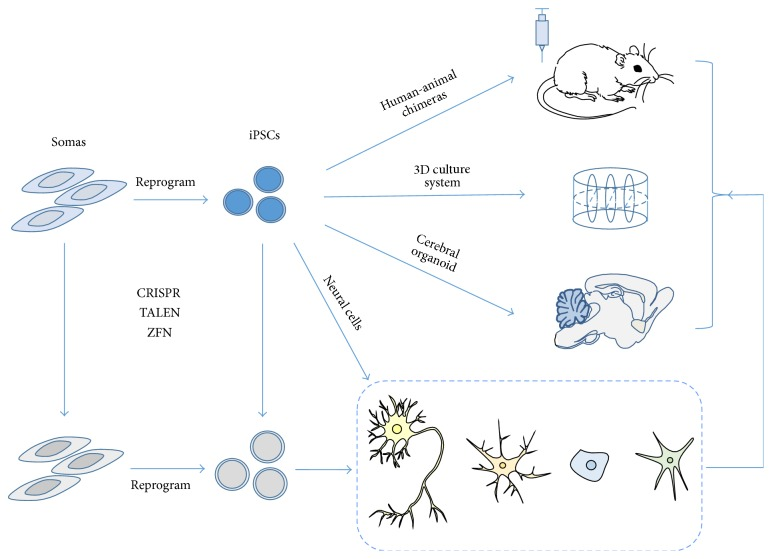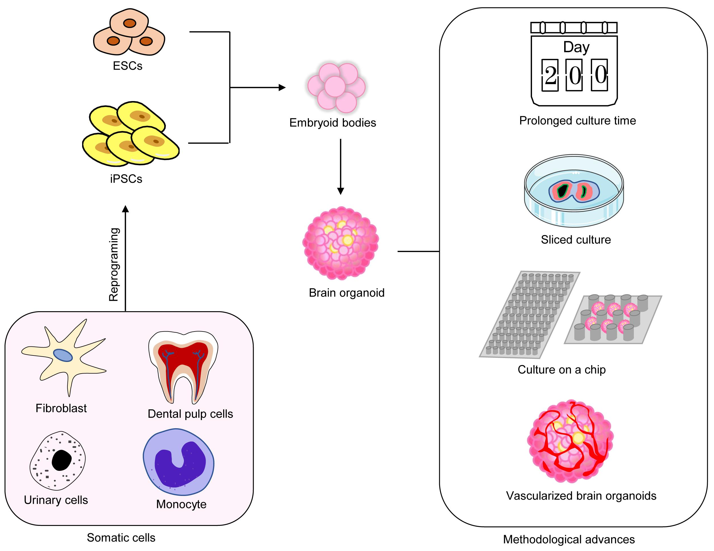The relative inaccessibility of human brain tissues has largely hampered the understanding of human neurological diseases and impeded drug development. Recent advances in human induced pluripotent stem cells (iPSCs) and organoids have led to the generation of unlimited human neural cells and in vitro models and thereby facilitate the research of brain development and pathology, and promote the development of potent drugs to treat neurodevelopmental diseases. With a decade of experience in stem cell therapy development, Creative Biolabs provides high-quality iPSC reprogramming & differentiation & characterization and organoids development services to our customers all over the world.
Neurological disorders, recognized as major causes of death and disability, affect almost a billion persons worldwide. With the accelerated aging of the population, the number of neurological cases is rising and will continue to increase. Disorders of the nervous system may involve the central and peripheral nervous system, such as the brain, spinal cord, cranial nerves, peripheral nerves, nerve roots, autonomic nervous system, neuromuscular junction, and so on. There are many types of neurological disorders have been characterized, including epilepsy, stroke, Alzheimer's disease (AD), Parkinson's disease (PD), migraine, multiple sclerosis, neuroinfections, brain tumors, traumatic disorders, etc.
Neurological disorders of infancy, childhood and adolescence may cause neurological injury in early life and then result in adult disability, vulnerability to disease and premature mortality. In the aging population, neurodegenerative diseases characterized by premature and selective aging of nerve cells, have affected hundreds of millions of people worldwide. More than 6 million people die because of stroke each year; more than 50 million people have epilepsy worldwide; more than 47.5 million people with dementia (7.7 million new cases every year). Alzheimer's disease is the most common cause of dementia and may contribute to 60-70% of cases. All of these figures necessitate more neurological research and therapy development.
Discovery of reprogramming somatic cells to iPSCs has revolutionized the way to develop efficient in vitro models for neurological diseases, enabling us to uncover disease mechanisms and develop therapeutic strategies and drugs to treat them. iPSCs have shown absolute advantages over animal models in disease modeling, drug screening, and cell therapy. Almost all types of neural cells, including but not limited to neural stem cells, neurons, astrocytes, oligodendrocytes and microglia, can be derived from iPSCs currently. These patient-derived iPSCs model disease-specific pathophysiology and phenotypes and greatly advance compound screening and evaluation of drug efficacy. Therefore, application of iPSC is a new direction for studying neurological disease mechanisms and developing neuronal drug discovery.
 Fig.1 Applications of human iPSCs and iPSC-derived neural cells in neurological diseases.1, 3
Fig.1 Applications of human iPSCs and iPSC-derived neural cells in neurological diseases.1, 3
Brain organoids are miniature 3D organ models that mimic a patient's own brain cells in a dish. It is an innovative tool for neurological disease modeling and drug neurotoxicity screening. Brain organoids are generated by self-organization and differentiation from pluripotent stem cells under optimized culture conditions, including embryonic stem cells (ESCs) and iPSCs. Notably, brain organoids do not just faithfully capture the structural and cytoarchitectural aspects of human brain, their overall epigenomic and transcriptional programs could closely mimic that of human brain. 3D brain organoid culture systems have been widely applied in disease modeling, drug discovery, and the development of personalized medicine.
 Fig.2 Recent methodological advances in brain organoids.2, 3
Fig.2 Recent methodological advances in brain organoids.2, 3
Known for our deeply-rooted stem cell expertise and abundant experience, Creative Biolabs is dedicated to offering a comprehensive range of iPSC and organoids development services to accelerate your stem cell therapy projects. We offer high-quality customized service covering the entire discovery process of iPSC and organoids to best suit your technical, program, and budget requirements. Choose us to boost your neurological disease research and accelerate your neurological drug discovery.
Our iPSC platform is tailored for extensive research into nervous system disorders, neurodevelopment, and regenerative medicine. By utilizing cutting-edge techniques, our platform allows researchers to generate, characterize, and utilize iPSCs derived from various cellular sources, enabling them to model neurological conditions with high precision. Key components of our service include:
Our iPSC platform for nervous system research provides an innovative and versatile toolset for understanding the complexities of the nervous system and advancing therapeutic strategies. Through collaboration, cutting-edge technology, and rigorous scientific research, we are committed to facilitating breakthroughs in the field of neuroscience.
Our platform has several advantages tailored for researchers in the field of nervous system research.
Below are the findings presented in the article related to iPSC research platform for nervous system.
Researchers have reported a method to generate brain organoids containing microglia derived from human pluripotent stem cells. Using this platform, Western Pacific Amyotrophic Lateral Sclerosis and Parkinson's disease-dementia syndrome (ALS-PDC) brain organoids were generated from patient-derived iPSCs. Their results showed that ALS-PDC-infected organoids had more reactive astrocytes and M1 microglia and fewer resting and M2 microglia than control organoids.
Overall, they developed a platform for obtaining patient-derived organoids containing neurons, astrocytes, and microglia for disease modeling. This system can recapitulate the development and neurodegeneration of the human brain following exposure to the neurotoxin BMAA.
References
For Research Use Only. Not For Clinical Use.